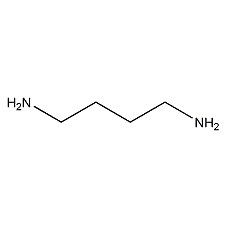
Structural formula
| Business number | 031K |
|---|---|
| Molecular formula | C4H12N2 |
| Molecular weight | 88.15 |
| label |
tetramethylenediamine, 1,4-Butanediamine, 1,4-Butylendiamine, TetramethylenediaminePutrescine, Putrecine, linear compound |
Numbering system
CAS number:110-60-1
MDL number:MFCD00008235
EINECS number:203-782-3
RTECS number:EJ6800000
BRN number:605282
PubChem number:24859702
Physical property data
1. Characteristics: colorless crystal with the smell of hexahydropyridine. [1]
2. Melting point (℃): 27~28[2]
3. Boiling point (℃) :158~160[3]
4. Relative density (water=1): 0.88[4]
5 .Octanol/water partition coefficient: -0.7[5]
6. Flash point (℃): 51.67[6]
7. Explosion upper limit (%): 9.1[7]
8. Explosion lower limit (%): 0.9[8]
9. Solubility: Easily soluble in water. [9]
Toxicological data
1. Acute toxicity[10] LD50: 463mg/kg (rat oral); 1576mg/kg (rabbit dermal)
2. Irritation No information
Ecological data
1. Ecotoxicity No data available
2. Biodegradability No data available
3 .Non-biodegradability No information available
4. Other harmful effects[11] This substance is harmful to the environment and should be specially Pay attention to water pollution.
Molecular structure data
1. Molar refractive index: 27.65
2. Molar volume (cm3/mol): 101.9
3. Isotonic specific volume (90.2K ): 249.3
4. Surface tension (dyne/cm): 35.8
5. Polarizability (10-24cm3): 10.96
Compute chemical data
1. Reference value for hydrophobic parameter calculation (XlogP): -0.9
2. Number of hydrogen bond donors: 2
3. Number of hydrogen bond acceptors: 2
p>
4. Number of rotatable chemical bonds: 3
5. Number of tautomers: none
6. Topological molecule polar surface area 52
7. Number of heavy atoms: 6
8. Surface charge: 0
9. Complexity: 17.5
10. Number of isotope atoms: 0
11. Determine the number of atomic stereocenters: 0
12. Uncertain number of atomic stereocenters: 0
13. Determine the number of chemical bond stereocenters: 0
14. Number of uncertain chemical bond stereocenters: 0
15. Number of covalent bond units: 1
Properties and stability
1. Stability[12] Stable
2. Incompatible substances[13] Strong oxidants, acids, acid chlorides, acid anhydrides
3. Polymerization hazardsHarm[14] No aggregation
Storage method
Storage Precautions[15] Stored in a cool, ventilated warehouse. Keep away from fire and heat sources. The packaging is sealed. They should be stored separately from oxidants, acids, and food chemicals, and avoid mixed storage. Use explosion-proof lighting and ventilation facilities. It is prohibited to use mechanical equipment and tools that are prone to sparks. Suitable materials should be available in the storage area to contain spills.
Synthesis method
1. Dioxime is obtained by reacting pyrrole with hydroxylamine hydrochloride, and then reduced to obtain butanediamine.
Purpose
1. Biochemical studies are used to stimulate the greening of chromatin. Organic Synthesis.
2. Used as chemical intermediates. [16]

 微信扫一扫打赏
微信扫一扫打赏

